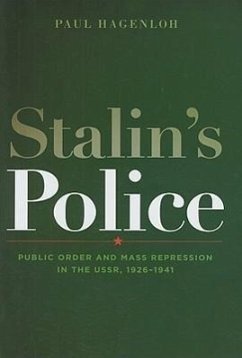"Stalin's Police" offers a new interpretation of the mass repressions associated with the Stalinist terror of the late 1930s. This pioneering study traces the development of professional policing from its pre-revolutionary origins through the late 1930s and early 1940s. Paul Hagenloh argues that the policing methods employed in the late 1930s were the culmination of a set of ideologically driven policies dating back to the previous decade. Hagenloh's vivid and monumental account is the first to show how Stalin's peculiar brand of policing--in which criminals, juvenile delinquents, and other marginalized population groups were seen increasingly as threats to the political and social order--supplied the core mechanism of the Great Terror.
Hinweis: Dieser Artikel kann nur an eine deutsche Lieferadresse ausgeliefert werden.
Hinweis: Dieser Artikel kann nur an eine deutsche Lieferadresse ausgeliefert werden.








